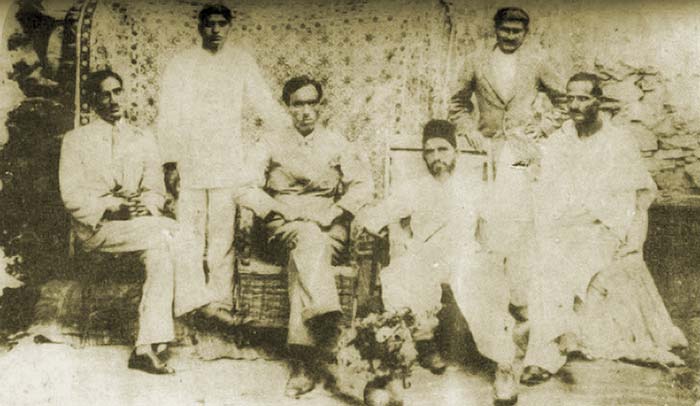It was just a small space that helped Kashmir’s well-read gentlemen to see a future in wake of Russian and French revolutions that got Kashmir out of an exploitative monarchy. Post partition, there came Coffee House and now food-joints with bookracks as libraries are almost everywhere. But there is no space that can come even closer to the Reading Room of 1930s, reports Saima Bashir

Standing : Ghulam Nabi Gilkar, Molvi Abdul Rahim
Literally, Kashmir owes its historic change to reading, yes to a Reading Room Party. It was established by two cousins Molvis’ Bashir-ud-din and Naseer-ud-din in 1929.
Bashir-ud-din was a school teacher and Naseer-ud-Din, though well-read, was denied a government job. He became a journalist. They established Reading Room Party to discuss the French and Russian revolutions and, in its backdrop, explore a way forward for J&K. Soon, they were also joined by G N Gilkar, Muhammad Rajab and Muhammad Yahya Rafiqui.
This was the place where the Kashmiri intellectuals of 1930s would meet, think and discuss. Though regulated by the Maharaja’s government, the Reading Room would have an uninterrupted flow of newspapers and journals, mostly from undivided Punjab. This Reading Room eventually laid the foundations of Kashmir’s political struggle against autocracy.
Many decades later, post-partition Reading Room paved way to a few libraries that were source of knowledge and interaction for a ‘freed’ lot, who were keen to explore. As number of libraries increased, the books increasingly were linked with the careers. Then bureaucracy took over and the influenced started taking books home and leaving libraries empty.
Then Coffee House took over. Though devoid of books, it was a free space for ideas-exchange. Government officials, journalists, businessman, would hold endless discussions over a cup of coffee.
“I used to go to the coffee house always with my producer before my recordings,” Zareef A Zareef, poet and former government officer said. “I used to discuss the script with him there.”
Then a new situation emerged that led to the closure of the Coffee House. Almost two-and-a-half decades later, the internet arrived on the scene.
As social websites offered an alternative, they failed to replace the culture of Reading Room.
It is this vacuum that some young entrepreneurs are trying to fill with commercial spaces where they have access to some books, free internet and a cup of tea or coffee. In the last few years many such joints have emerged. Some were coffee shops that added libraries and some had to sell books so they started greeting visitors with a mug of coffee.
Javid Parsa, set up Kathi Junction to sell special dishes. Marketing his initiative on social networking websites, he soon felt the need to add a book rack, he calls mini-library.
“Books are the only source which helps us to grow altogether,” Said Parsa. Impressed by the reading habits of people in mainland India; he feels his ‘library’ has triggered a shift in his clientele. “Students who earlier used to escape their schools and come for just hangouts are now reading books seriously.”
Some of them have started donating books so that others will also read. In last five months his ‘library’ was richer by 400 books that his clients donated. Now, he organises small events in which his clients, mostly students discuss, crucial issues.
Then Arslan launched his Books and Bricks, just outside the main gate of Amar Singh College. Having spent seven years in London, he was heavily influenced by the reading culture there.
“I thought while earning my livelihood from the society I must also try to give something back,” Arsalan said.
“To increase the book reading culture among youth and revive traditional book reading culture among elders was the best idea that struck my mind.”
Kashmir’s reading habit has declined, not lost. But it needs to be inculcated and rediscovered. For this purpose reading clubs must be established across the state, Arsalan said.
“These are impressive initiatives of the new generation,” Prof Abdul Majeed Baba, head of the Libraries Department at the University of Kashmir, said. “But this is no alternative to the India Coffee House or the Reading Room where serious issues were discussed.”
Once can lend books from these spaces, but cannot read because reading requires a different atmosphere.
Unlike the Reading Room, these ‘mini-libraries’ have a commercial motive. “But even if it is just a fad and not a movement, it is not bad,” says Shams Imran, a media teacher. “The two cousins literally begged to fund the Reading Room once that gave the initiative an immortal base,” says journalist Zaheer-ud-Din, who has been writing on history for a very long time. “These ‘mini libraries’ are welcome but are completely different in process and purpose.”















